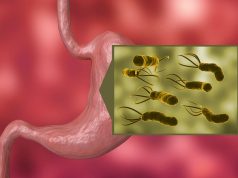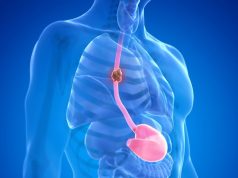PPI use, but not H2 receptor antagonists, linked to reduced risk of progression in Barrett’s esophagus
TUESDAY, Feb. 14, 2017 (HealthDay News) — For patients with Barrett’s esophagus (BE), proton pump inhibitor (PPI) but not histamine-2 receptor antagonist (H2RA) use is associated with reduced risk of neoplastic progression, according to research published online Feb. 11 in the Journal of Digestive Diseases.
Prashanthi N. Thota, M.D., from the Cleveland Clinic, and colleagues conducted a retrospective analysis of prospectively collected data from patients in a BE registry from 2002 to 2015. The cohort included 1,466 patients with a mean age of 61 years.
The researchers found that during a median follow-up of 43.6 months, 57 of the 1,025 patients without prevalent high-grade dysplasia (HGD) or esophageal adenocarcinoma (EAC) progressed to HGD or EAC. Lower risk of neoplastic progression was seen for PPI use (62 percent in progressors versus 78 percent in non-progressors; P = 0.007), but not H2RA use (14 percent in progressors versus 22 percent in non-progressors; P = 0.162). There was no synergistic effect for addition of H2RA to PPI on the risk of neoplastic progression to HGD or EAC on multivariate analysis (relative risk, 0.33; 95 percent confidence interval, 0.05 to 2.29; P = 0.262).
“H2RA do not seem to have any chemopreventive role in patients with BE,” the authors write.
Full Text (subscription or payment may be required)
Copyright © 2017 HealthDay. All rights reserved.








